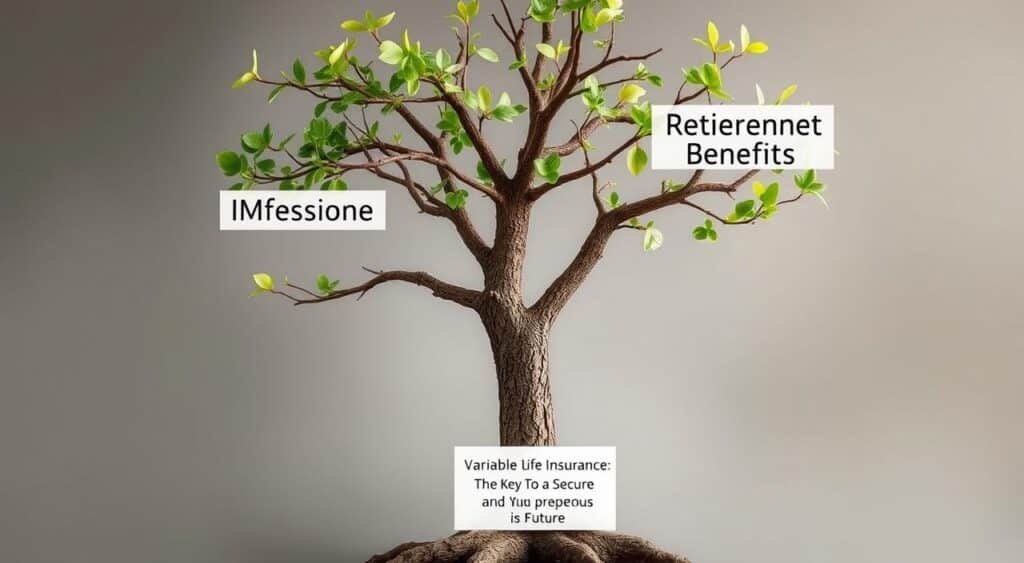In today’s fast-changing financial world, variable life insurance stands out as a key tool for securing your future. It’s a type of permanent life insurance that offers both the safety of a death benefit and the chance for your money to grow. This makes it a unique way to build a prosperous future for yourself and your loved ones.
By diving into the details of variable life insurance, you can open up new opportunities. It helps protect your family from the unexpected. This way, you can have peace of mind knowing you’re prepared for whatever life brings.
Key Takeaways
- Variable life insurance provides lifelong coverage with a death benefit and the potential for cash value growth through market-based investments.
- It offers flexible premium payments and the ability to adjust your coverage as your needs evolve.
- The cash value component of variable life insurance can be used for retirement planning or estate planning purposes.
- Variable life insurance offers tax-deferred growth on the cash value, which can be a valuable asset in building long-term wealth.
- Understanding the advantages and disadvantages of variable life insurance is crucial in determining if it’s the right fit for your financial goals.
What is Variable Life Insurance?
Variable life insurance is a special kind of permanent life insurance. It combines life insurance with an investment part. Unlike term life insurance, it covers you for your whole life. The policy has two main parts: a death benefit and a cash value account.
Understanding Variable Universal Life Insurance
Variable universal life insurance (VUL) is a type of variable life insurance with more flexibility. With VUL, you can change your premium payments and death benefit coverage within limits. This gives you more control over your life insurance plan.
How Variable Universal Life Insurance Works
The cash value part of a variable life insurance policy can be put into different investments like stocks, bonds, and mutual funds. These investments can grow over time, giving you a chance for tax-deferred growth. But remember, the cash value can also go down due to market changes, leading to losses or gains.
Also Read: Exploring Gator Pride: A Journey Through The University Of Florida
Variable universal life insurance lets you adjust your premium payments and death benefit coverage as your needs change. This is great for those who go through life events or financial changes. It helps you adapt your life insurance to fit your new situation.
Who Can Benefit from Variable Life Insurance?
Variable life insurance is a flexible financial tool. It suits people with different financial needs and risk levels. Those who might find it useful include:
- High-income earners: This type of insurance helps high-income people grow their wealth without taxes. It can boost their retirement savings or help transfer wealth to the next generation.
- Retirees: Retirees who are okay with some risk can use it for tax-smart income. It can also help them leave a legacy for their loved ones.
- Individuals with long-term financial goals: For those looking ahead, variable life insurance’s investment part is great. It’s for those ready to take on market risks for a chance at higher returns.
But, variable life insurance is not for everyone. It’s complex and carries market risks. People who prefer less risk or have short-term financial goals might prefer other types of insurance.
| Potential Beneficiaries | Key Considerations |
|---|---|
| High-income earners | Tax-deferred growth, wealth transfer |
| Retirees | Tax-efficient income, legacy planning |
| Long-term investors | Market-based growth potential |
| Risk-tolerant individuals | Acceptance of investment risk |
Choosing variable life insurance should be done with a financial expert. Consider your financial situation, how much risk you can handle, and your long-term goals.
Also Read: Building Futures: The Role Of An Education Degree In Shaping Tomorrow

“Variable life insurance can be a powerful tool for high-income earners and retirees who are comfortable with investment risk and are looking to grow their wealth or plan for a secure financial future.”
Advantages and Disadvantages of Variable Life Insurance
Variable life insurance is a special type of life insurance. It has both good and bad points. Knowing these can help people decide if it fits their financial plans and how much risk they can handle.
Advantages of Variable Life Insurance
One big plus is the tax-deferred growth of the cash value. This means people might see better returns on their money than with other life insurance. Plus, the death benefit is usually tax-free, helping out their loved ones.
Another big benefit is the flexibility to change how much you pay and how much coverage you have. This is great for those whose money situation changes. Also, variable life insurance lets you invest in the stock market, which could give you higher returns than fixed-rate policies.
Also Read: Rebirth Of Beauty: Unveiling The Magic Of Renaissance Art
Disadvantages of Variable Life Insurance
But, there are downsides too. The investments can go up and down, affecting the cash value. People buying this insurance must be okay with this risk. Also, these policies usually have higher costs and fees than other types, which can lower the policy’s value.
Another thing to consider is how complex these policies are. They need a good understanding of investments and managing risks to match your financial goals. You’ll need to keep an eye on how your investments are doing and adjust them if needed.
Also Read: Securing Success: The Critical Role Of Key Person Insurance

“Carefully weighing the pros and cons of variable life insurance is crucial to determine if it’s the right fit for your financial needs and risk tolerance.”
Tax and Retirement Implications of Variable Life Insurance
Variable life insurance has many tax and retirement benefits. The main advantage is the tax-deferred growth of the cash value. This means earnings in the policy aren’t taxed until you take out the money. This lets your money grow faster and earn more interest.
Variable life insurance also lets you borrow against your policy’s cash value without paying taxes. This can be great for retirement planning or other financial needs. For those who don’t fit into a Roth IRA, it’s a way to grow money with tax benefits like a Roth.
But, knowing the tax rules and IRS guidelines for variable life insurance is key. Taking out money the wrong way or letting your policy lapse can lead to taxes. So, it’s smart to work with a financial advisor to follow the rules and get the most tax benefits from your policy.
| Tax Advantage | Explanation |
|---|---|
| Tax-Deferred Growth | The cash value growth within the variable life insurance policy is not subject to taxation until withdrawal, allowing for faster compound growth. |
| Tax-Free Policy Loans | Policyholders can borrow against the cash value of their variable life insurance policy without incurring taxes, which can be useful for retirement planning or other financial needs. |
| Tax-Advantaged Retirement Savings | For high-income earners who do not qualify for a Roth IRA, variable life insurance can provide a way to grow assets on a tax-advantaged basis similar to a Roth. |

Understanding how variable life insurance affects taxes and retirement helps policyholders make smart choices. This way, they can get the most out of this financial tool and plan for a secure future.
Also Read: Protect And Grow: The Dual Benefits Of Universal Life Insurance
Key Takeaways of variable life insurance
Variable life insurance is a flexible financial tool that helps individuals and families. It offers many benefits. Here are the main points to remember:
- Death Benefit Protection: This type of insurance provides a death benefit. It ensures your loved ones get the financial support they need if you pass away.
- Cash Value Growth Potential: These policies let you grow your cash value through investments. This can help you build wealth over time.
- Flexibility in Coverage and Premiums: You can adjust your coverage and premium payments as your needs and goals change.
For those planning for retirement and estate planning, variable life insurance is a great choice. It offers investment potential and can help you manage market risk. Your assets can grow in a tax-deferred way.
But, it’s important to know the complexity and fees of variable life insurance. Think about your financial goals, how much risk you can handle, and your long-term needs. This will help you decide if this policy is right for you.
“Variable life insurance can be a powerful tool for comprehensive financial planning, but it’s important to understand the nuances and potential risks before making a decision.”

Comparing Variable Life Insurance to Other Life Insurance Types
Variable life insurance is a special kind of life insurance. It offers a death benefit and the chance for cash value to grow through investments. How does it stack up against term, whole, and universal life insurance?
Term life insurance covers you for a certain period and costs less. But, variable life insurance gives you coverage for life and lets you build cash value. This cash value is a big plus, but it means paying more in premiums and dealing with more complexity.
Whole life insurance also covers you forever and lets you build cash value. But, the cash value grows at a set rate, not based on investments. This can be more stable, but it might not grow as much as variable life insurance.
Universal life insurance is like variable life but without the investment part. It focuses on the death benefit and cash value. This makes it simpler, but it won’t grow as much as variable life insurance.
Variable life insurance is unique because of its guaranteed death benefit, cash value growth through investments, and flexible payments and coverage. But, its complexity and cost might not be right for everyone.

Also Read: What Is A Life Insurance Quote?
Conclusion
Variable life insurance is a great way to secure a prosperous future. It offers a guaranteed death benefit and the chance for cash value growth through investments. This makes it a unique choice for financial protection and building wealth.
But, it’s important to weigh the pros and cons, think about taxes and retirement, and compare it to other insurance options. This helps you see if it fits your financial goals and how much risk you can handle. With careful planning, variable life insurance can help you and your loved ones have a secure future.
Thinking about retirement, estate planning, or just wanting solid financial protection? Consider variable life insurance as part of your financial plan. It combines investment potential with tailored coverage. This way, you can aim for a future that is both secure and prosperous.
FAQs
Q: How does variable life insurance work?
A: Variable life insurance works by combining a death benefit with an investment component. As long as you pay premiums, you can allocate a portion of your payments to various investment options, allowing the cash value of your policy to grow based on the performance of those investments.
Q: What are the pros and cons of variable life insurance?
A: The pros of variable life insurance include flexible premiums, potential for cash value growth, and a death benefit that can increase based on investment performance. The cons include higher premiums compared to term insurance, market risks affecting the cash value, and complexity in understanding the investment options.
Q: What is the death benefit in variable life insurance?
A: The death benefit in variable life insurance is the amount paid to your beneficiaries upon your death. It can vary based on the investment performance of the policy’s cash value, but it will not fall below the minimum specified in the policy, provided premiums are paid as required.
Q: How can I buy variable life insurance?
A: To buy variable life insurance, you can consult with a licensed insurance agent or financial advisor who can provide you with quotes from the best life insurance companies. They will help you understand the different types of variable life insurance policies available and assist you in choosing the right one for your needs.
Q: What are the benefits of variable life insurance?
A: The benefits of variable life insurance include the ability to build cash value through investment options, potential for higher returns compared to whole life insurance, flexibility in premium payments, and a death benefit that can be adjusted based on your financial goals.
Q: What types of variable life insurance are there?
A: There are several types of variable life insurance, including traditional variable life policies, variable universal life insurance, and indexed variable life insurance. Each type offers different investment options and flexibility in terms of premium payments and death benefits.
Q: What are the risks of variable life insurance?
A: The risks of variable life insurance include market volatility affecting the cash value of your policy, potential loss of cash value if investments perform poorly, and the possibility of higher premiums if you choose to increase your death benefit. It’s important to understand these risks before purchasing a variable life insurance policy.
Q: How does a policy loan work in variable life insurance?
A: A policy loan allows you to borrow against the cash value of your variable life insurance policy. The loan amount is deducted from the death benefit, and you will need to pay interest on the loan. If the loan is not repaid, it will reduce the death benefit available to your beneficiaries.
Q: How do I compare variable life insurance with term and whole life insurance?
A: When comparing variable life insurance with term and whole life insurance, consider factors such as your financial goals, need for flexibility, and risk tolerance. Term insurance is usually more affordable but does not build cash value, while whole life insurance offers guaranteed cash value growth but at a higher premium cost. Variable life insurance provides both investment opportunities and a death benefit but carries more risk and complexity.
Source Links
- https://www.marketwatch.com/guides/life-insurance/variable-life-insurance/
- https://www.protective.com/learn/what-is-universal-variable-life-insurance
- https://www.thrivent.com/insights/life-insurance/how-variable-universal-life-insurance-works





